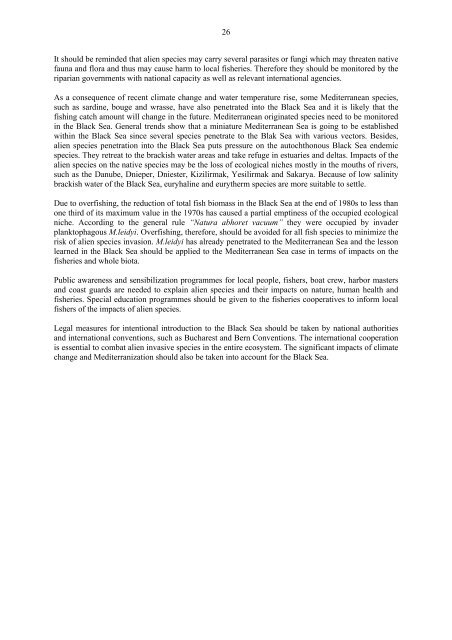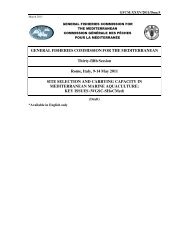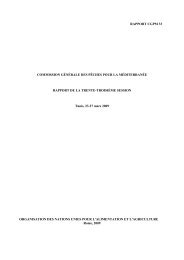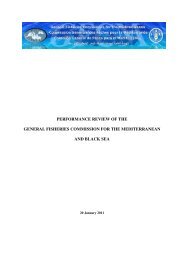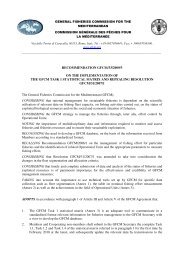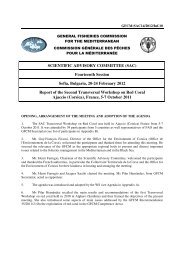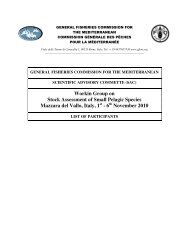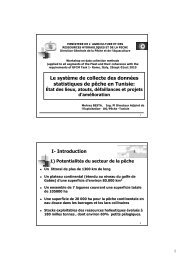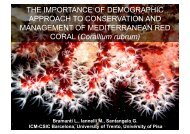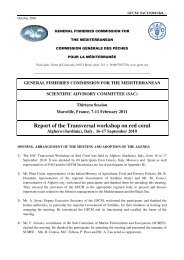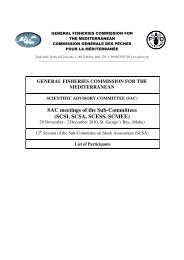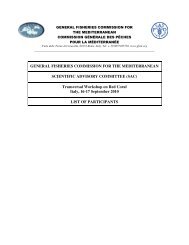Status of alien species in the Mediterranean and Black Sea
Status of alien species in the Mediterranean and Black Sea
Status of alien species in the Mediterranean and Black Sea
You also want an ePaper? Increase the reach of your titles
YUMPU automatically turns print PDFs into web optimized ePapers that Google loves.
26<br />
It should be rem<strong>in</strong>ded that <strong>alien</strong> <strong>species</strong> may carry several parasites or fungi which may threaten native<br />
fauna <strong>and</strong> flora <strong>and</strong> thus may cause harm to local fisheries. Therefore <strong>the</strong>y should be monitored by <strong>the</strong><br />
riparian governments with national capacity as well as relevant <strong>in</strong>ternational agencies.<br />
As a consequence <strong>of</strong> recent climate change <strong>and</strong> water temperature rise, some <strong>Mediterranean</strong> <strong>species</strong>,<br />
such as sard<strong>in</strong>e, bouge <strong>and</strong> wrasse, have also penetrated <strong>in</strong>to <strong>the</strong> <strong>Black</strong> <strong>Sea</strong> <strong>and</strong> it is likely that <strong>the</strong><br />
fish<strong>in</strong>g catch amount will change <strong>in</strong> <strong>the</strong> future. <strong>Mediterranean</strong> orig<strong>in</strong>ated <strong>species</strong> need to be monitored<br />
<strong>in</strong> <strong>the</strong> <strong>Black</strong> <strong>Sea</strong>. General trends show that a m<strong>in</strong>iature <strong>Mediterranean</strong> <strong>Sea</strong> is go<strong>in</strong>g to be established<br />
with<strong>in</strong> <strong>the</strong> <strong>Black</strong> <strong>Sea</strong> s<strong>in</strong>ce several <strong>species</strong> penetrate to <strong>the</strong> Blak <strong>Sea</strong> with various vectors. Besides,<br />
<strong>alien</strong> <strong>species</strong> penetration <strong>in</strong>to <strong>the</strong> <strong>Black</strong> <strong>Sea</strong> puts pressure on <strong>the</strong> autochthonous <strong>Black</strong> <strong>Sea</strong> endemic<br />
<strong>species</strong>. They retreat to <strong>the</strong> brackish water areas <strong>and</strong> take refuge <strong>in</strong> estuaries <strong>and</strong> deltas. Impacts <strong>of</strong> <strong>the</strong><br />
<strong>alien</strong> <strong>species</strong> on <strong>the</strong> native <strong>species</strong> may be <strong>the</strong> loss <strong>of</strong> ecological niches mostly <strong>in</strong> <strong>the</strong> mouths <strong>of</strong> rivers,<br />
such as <strong>the</strong> Danube, Dnieper, Dniester, Kizilirmak, Yesilirmak <strong>and</strong> Sakarya. Because <strong>of</strong> low sal<strong>in</strong>ity<br />
brackish water <strong>of</strong> <strong>the</strong> <strong>Black</strong> <strong>Sea</strong>, euryhal<strong>in</strong>e <strong>and</strong> eury<strong>the</strong>rm <strong>species</strong> are more suitable to settle.<br />
Due to overfish<strong>in</strong>g, <strong>the</strong> reduction <strong>of</strong> total fish biomass <strong>in</strong> <strong>the</strong> <strong>Black</strong> <strong>Sea</strong> at <strong>the</strong> end <strong>of</strong> 1980s to less than<br />
one third <strong>of</strong> its maximum value <strong>in</strong> <strong>the</strong> 1970s has caused a partial empt<strong>in</strong>ess <strong>of</strong> <strong>the</strong> occupied ecological<br />
niche. Accord<strong>in</strong>g to <strong>the</strong> general rule “Natura abhoret vacuum” <strong>the</strong>y were occupied by <strong>in</strong>vader<br />
planktophagous M.leidyi. Overfish<strong>in</strong>g, <strong>the</strong>refore, should be avoided for all fish <strong>species</strong> to m<strong>in</strong>imize <strong>the</strong><br />
risk <strong>of</strong> <strong>alien</strong> <strong>species</strong> <strong>in</strong>vasion. M.leidyi has already penetrated to <strong>the</strong> <strong>Mediterranean</strong> <strong>Sea</strong> <strong>and</strong> <strong>the</strong> lesson<br />
learned <strong>in</strong> <strong>the</strong> <strong>Black</strong> <strong>Sea</strong> should be applied to <strong>the</strong> <strong>Mediterranean</strong> <strong>Sea</strong> case <strong>in</strong> terms <strong>of</strong> impacts on <strong>the</strong><br />
fisheries <strong>and</strong> whole biota.<br />
Public awareness <strong>and</strong> sensibilization programmes for local people, fishers, boat crew, harbor masters<br />
<strong>and</strong> coast guards are needed to expla<strong>in</strong> <strong>alien</strong> <strong>species</strong> <strong>and</strong> <strong>the</strong>ir impacts on nature, human health <strong>and</strong><br />
fisheries. Special education programmes should be given to <strong>the</strong> fisheries cooperatives to <strong>in</strong>form local<br />
fishers <strong>of</strong> <strong>the</strong> impacts <strong>of</strong> <strong>alien</strong> <strong>species</strong>.<br />
Legal measures for <strong>in</strong>tentional <strong>in</strong>troduction to <strong>the</strong> <strong>Black</strong> <strong>Sea</strong> should be taken by national authorities<br />
<strong>and</strong> <strong>in</strong>ternational conventions, such as Bucharest <strong>and</strong> Bern Conventions. The <strong>in</strong>ternational cooperation<br />
is essential to combat <strong>alien</strong> <strong>in</strong>vasive <strong>species</strong> <strong>in</strong> <strong>the</strong> entire ecosystem. The significant impacts <strong>of</strong> climate<br />
change <strong>and</strong> Mediterranization should also be taken <strong>in</strong>to account for <strong>the</strong> <strong>Black</strong> <strong>Sea</strong>.


